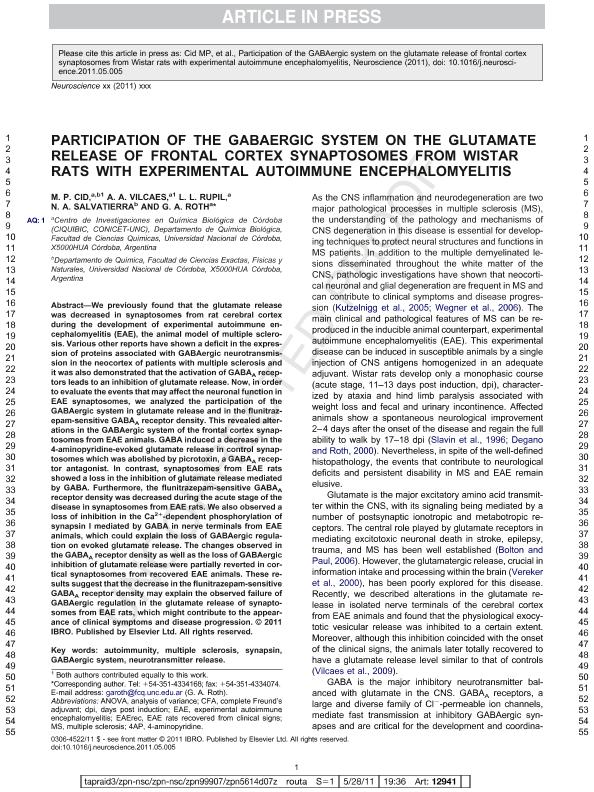Mostrar el registro sencillo del ítem
dc.contributor.author
Cid, Mariana Paula

dc.contributor.author
Vilcaes, Aldo Alejandro

dc.contributor.author
Rupil, Lucia

dc.contributor.author
Salvatierra, Nancy Alicia

dc.contributor.author
Roth, German Alfredo

dc.date.available
2020-02-11T14:39:19Z
dc.date.issued
2011-08
dc.identifier.citation
Cid, Mariana Paula; Vilcaes, Aldo Alejandro; Rupil, Lucia; Salvatierra, Nancy Alicia; Roth, German Alfredo; Participation of the GABAergic system on the glutamate release of frontal cortex synaptosomes from Wistar rats with experimental autoimmune encephalomyelitis; Pergamon-Elsevier Science Ltd; Neuroscience; 189; 8-2011; 337-344
dc.identifier.issn
0306-4522
dc.identifier.uri
http://hdl.handle.net/11336/97158
dc.description.abstract
We previously found that the glutamate release was decreased in synaptosomes from rat cerebral cortex during the development of experimental autoimmune encephalomyelitis (EAE), the animal model of multiple sclerosis. Various other reports have shown a deficit in the expression of proteins associated with GABAergic neurotransmission in the neocortex of patients with multiple sclerosis and it was also demonstrated that the activation of GABA A receptors leads to an inhibition of glutamate release. Now, in order to evaluate the events that may affect the neuronal function in EAE synaptosomes, we analyzed the participation of the GABAergic system in glutamate release and in the flunitrazepam-sensitive GABA A receptor density. This revealed alterations in the GABAergic system of the frontal cortex synaptosomes from EAE animals. GABA induced a decrease in the 4-aminopyridine-evoked glutamate release in control synaptosomes which was abolished by picrotoxin, a GABA A receptor antagonist. In contrast, synaptosomes from EAE rats showed a loss in the inhibition of glutamate release mediated by GABA. Furthermore, the flunitrazepam-sensitive GABA A receptor density was decreased during the acute stage of the disease in synaptosomes from EAE rats. We also observed a loss of inhibition in the Ca 2+-dependent phosphorylation of synapsin I mediated by GABA in nerve terminals from EAE animals, which could explain the loss of GABAergic regulation on evoked glutamate release. The changes observed in the GABA A receptor density as well as the loss of GABAergic inhibition of glutamate release were partially reverted in cortical synaptosomes from recovered EAE animals. These results suggest that the decrease in the flunitrazepam-sensitive GABA A receptor density may explain the observed failure of GABAergic regulation in the glutamate release of synaptosomes from EAE rats, which might contribute to the appearance of clinical symptoms and disease progression.
dc.format
application/pdf
dc.language.iso
eng
dc.publisher
Pergamon-Elsevier Science Ltd

dc.rights
info:eu-repo/semantics/openAccess
dc.rights.uri
https://creativecommons.org/licenses/by-nc-sa/2.5/ar/
dc.subject
AUTOIMMUNITY
dc.subject
GABAERGIC SYSTEM
dc.subject
MULTIPLE SCLEROSIS
dc.subject
NEUROTRANSMITTER RELEASE
dc.subject
SYNAPSIN
dc.subject.classification
Neurociencias

dc.subject.classification
Medicina Básica

dc.subject.classification
CIENCIAS MÉDICAS Y DE LA SALUD

dc.title
Participation of the GABAergic system on the glutamate release of frontal cortex synaptosomes from Wistar rats with experimental autoimmune encephalomyelitis
dc.type
info:eu-repo/semantics/article
dc.type
info:ar-repo/semantics/artículo
dc.type
info:eu-repo/semantics/publishedVersion
dc.date.updated
2019-09-23T17:27:26Z
dc.journal.volume
189
dc.journal.pagination
337-344
dc.journal.pais
Países Bajos

dc.journal.ciudad
Amsterdam
dc.description.fil
Fil: Cid, Mariana Paula. Consejo Nacional de Investigaciones Científicas y Técnicas. Centro Científico Tecnológico Conicet - Córdoba. Centro de Investigaciones en Química Biológica de Córdoba. Universidad Nacional de Córdoba. Facultad de Ciencias Químicas. Centro de Investigaciones en Química Biológica de Córdoba; Argentina. Universidad Nacional de Córdoba. Facultad de Ciencias Exactas, Físicas y Naturales. Departamento de Química; Argentina
dc.description.fil
Fil: Vilcaes, Aldo Alejandro. Consejo Nacional de Investigaciones Científicas y Técnicas. Centro Científico Tecnológico Conicet - Córdoba. Centro de Investigaciones en Química Biológica de Córdoba. Universidad Nacional de Córdoba. Facultad de Ciencias Químicas. Centro de Investigaciones en Química Biológica de Córdoba; Argentina
dc.description.fil
Fil: Rupil, Lucia. Consejo Nacional de Investigaciones Científicas y Técnicas. Centro Científico Tecnológico Conicet - Córdoba. Centro de Investigaciones en Química Biológica de Córdoba. Universidad Nacional de Córdoba. Facultad de Ciencias Químicas. Centro de Investigaciones en Química Biológica de Córdoba; Argentina
dc.description.fil
Fil: Salvatierra, Nancy Alicia. Consejo Nacional de Investigaciones Científicas y Técnicas. Centro Científico Tecnológico Conicet - Córdoba. Instituto de Investigaciones Biológicas y Tecnológicas. Universidad Nacional de Córdoba. Facultad de Ciencias Exactas, Físicas y Naturales. Instituto de Investigaciones Biológicas y Tecnológicas; Argentina. Universidad Nacional de Córdoba. Facultad de Ciencias Exactas, Físicas y Naturales. Departamento de Química; Argentina
dc.description.fil
Fil: Roth, German Alfredo. Consejo Nacional de Investigaciones Científicas y Técnicas. Centro Científico Tecnológico Conicet - Córdoba. Centro de Investigaciones en Química Biológica de Córdoba. Universidad Nacional de Córdoba. Facultad de Ciencias Químicas. Centro de Investigaciones en Química Biológica de Córdoba; Argentina
dc.journal.title
Neuroscience

dc.relation.alternativeid
info:eu-repo/semantics/altIdentifier/url/http://www.dx.doi.org/10.1016/j.neuroscience.2011.05.005
dc.relation.alternativeid
info:eu-repo/semantics/altIdentifier/doi/http://dx.doi.org/10.1016/j.neuroscience.2011.05.005
Archivos asociados
